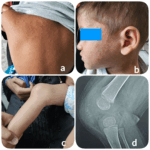Study finds multidisciplinary care approach results in better pain management, functionality and quality of life
Search results for: knee
One-Third of Total Knee Replacements May Be Inappropriate
Rheumatologists advised to use standardized measures of self-reported pain, functional status to determine which patients should have surgery
Improved Survival Odds Following Hip & Knee Replacements
Decreases in mortality rates following elective hip and knee replacement surgeries since 2004 may be partly due to modern surgical techniques and better pre- and post-op care.
ACR/ARHP Annual Meeting 2012: Physicians Search for Ways to Improve Clinical Outcomes for Total Knee Replacements (TKR)
Widely variable results for people post-TKR procedures have prompted doctors to develop a standardized approach to rehabilitation care
Young Patients, Old Knees
Knee OA may be more common in younger patients that previously thought
His and Hers Knees
Do gender-specific knee implants offer clinical benefits for women?
Exercises to Improve Outcomes in Knee Osteroarthritis
An exercise program can improve functionality and quality of life

ACR Image Competition 2025 Results, Part 1—Best Overall
Every year, the ACR conducts a case-based image competition. Images are submitted for peer review. The winning images are displayed at ACR Convergence and winners receive other benefits, as well. This year, the overall winning images were submitted by Madhuri Challa, MD, of Hyderabad, Telangana, India. Presentation These are the representative clinical and radiological images…

Arthritis Care & Research Now Has 2 Editors in Chief
Following a five-year term as editor in chief of Arthritis Care & Research (AC&R), Kelli Allen, PhD, is beginning another five-year stint with the journal, but now as co-editor in chief (co-EiC) with Daniel K. White, PT, ScD, who had formerly served as an AC&R associate editor. Dr. Allen is professor of medicine in the…
Effect of DMARDs on Pain Sensitivity in RA
Aydemir et al. examined the relationship between disease activity in rheumatoid arthritis (RA) and pain regulatory mechanisms of the central nervous system. They found that improvements in pain sensitivity were associated with reductions in disease activity in patients with RA after 12 weeks of treatment with disease-modifying anti-rheumatic drugs. This study underscores the importance of inflammatory and noninflammatory contributors to patient outcomes.
- « Previous Page
- 1
- …
- 8
- 9
- 10
- 11
- 12
- …
- 80
- Next Page »